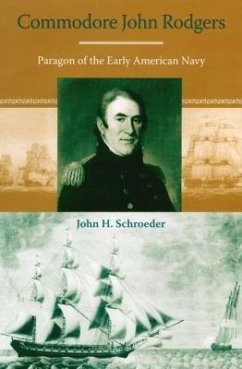Schroeder's interpretive biography restores Rodgers to his rightful place in history as the preeminent and most influential naval officer during America's Age of Sail. Between 1798 and 1815, Rodgers fought with distinction in the Naval War with France, the Barbary War, and the War of 1812. He spaced the postwar development of the navy as president of the Board of Navy Commissioners from 1815 to 1835, and he led a major diplomatic mission to the Mediterranean in the mid 1820s. Drawing on extensive manuscript sources--including the voluminous Rodgers family papers--and the wealth of articles, essays, and monographs on American naval history in recent years, Schroeder provides a candid appraisal of Rodgers' personal strengths and weaknesses, professional successes and failures. Resented for his gruff exterior but celebrated for his determination to build a navy of the highest professional standards, Rodgers never revealed to his naval contemporaries the passionate and emotional dimension of his character that is evident in his correspondence with his wife, Minerva, who bore him 11 children. Their letters represent a rare and remarkably detailed account of family life in the 19th century. Schroeder's thorough analysis of official documents offers a fresh perspective on the dramatic events of Rodgers' long career, including his personal involvement in the capture of the French frigate L'Insurgente in 1799, the war with Tripoli, the testing of Robert Fulton's experimental torpedoes in 1810, the Little Belt affair in 1811, the escape of the British frigate Belvidera in 1812, the defense of Baltimore in 1814, the deadly duel between Stephen Decatur and James Barron in 1820, and the introductionof steam power to the U.S. Navy.
Hinweis: Dieser Artikel kann nur an eine deutsche Lieferadresse ausgeliefert werden.
Hinweis: Dieser Artikel kann nur an eine deutsche Lieferadresse ausgeliefert werden.








